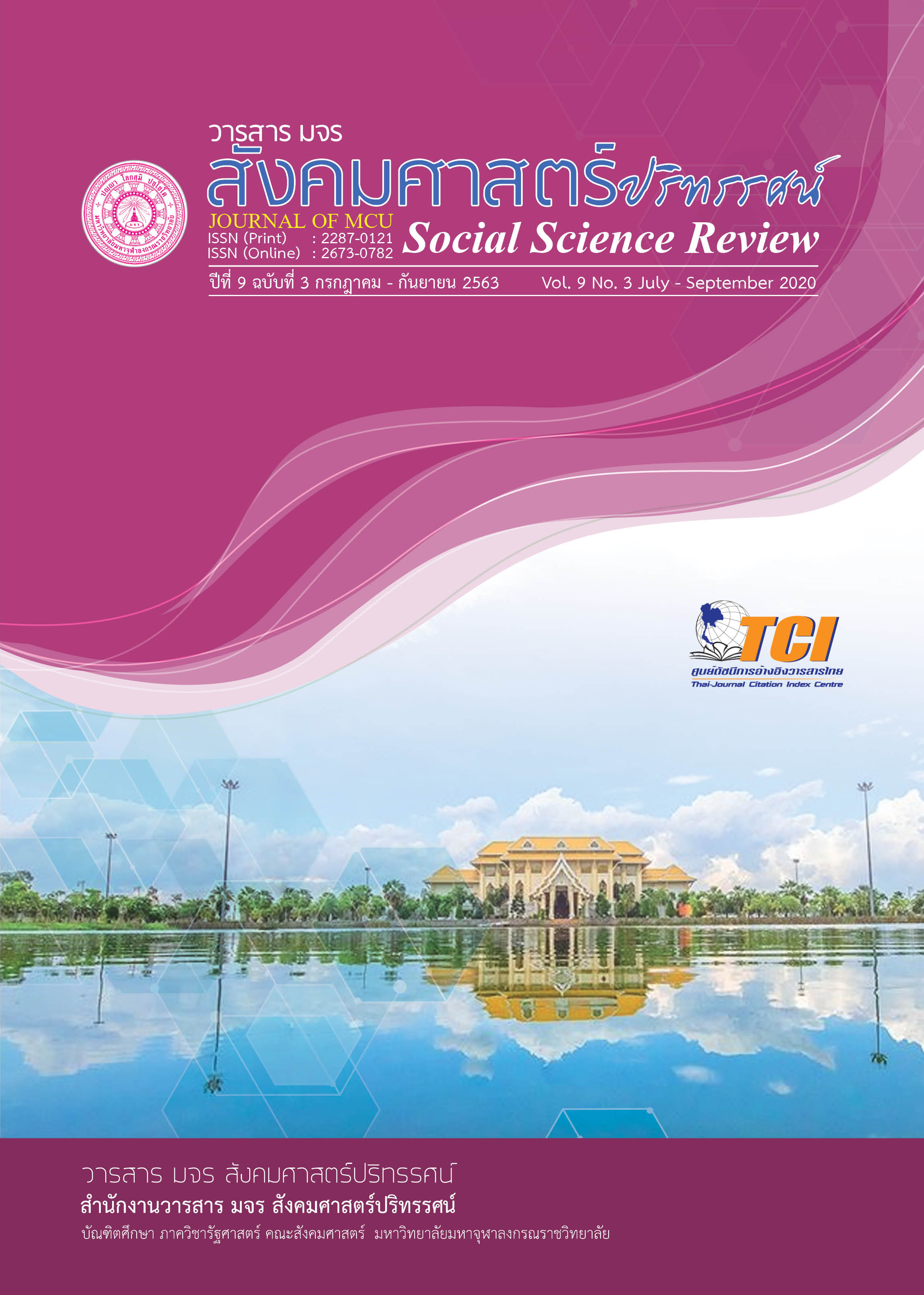แบบจำลองความสัมพันธ์ของปัจจัยเชิงสาเหตุในการมุ่งเน้นการเป็นผู้ประกอบการและผลการดำเนินงานของธุรกิจอาหารในกรุงเทพฯ
คำสำคัญ:
การมุ่งเน้นการเป็นผู้ประกอบการ, ผลการดำเนินงานธุรกิจ, ผู้ประกอบการธุรกิจอาหารบทคัดย่อ
บทความวิจัยนี้มีวัตถุประสงค์เพื่อศึกษาปัจจัยเชิงสาเหตุ ด้านภาวะผู้นำ ด้านสภาวะแวดล้อมเชิงพลวัต ด้านความหลงใหลในการประกอบการ และอิทธิพลของปัจจัยเชิงสาเหตุที่ส่งผลต่อการมุ่งเน้นการเป็นผู้ประกอบการและผลการดำเนินงานธุรกิจ เพื่อสร้างแบบจำลองความสัมพันธ์ของปัจจัยเชิงสาเหตุในการมุ่งเน้นการเป็นผู้ประกอบการและผลการดำเนินงานของธุรกิจอาหารในกรุงเทพฯ โดยการวิจัยนี้เป็นการวิจัยแบบผสมวิธีพหุระยะ (Multi-Phase Mixed Method) โดยมีกลุ่มตัวอย่างเป็นผู้ประกอบการธุรกิจอาหารในกรุงเทพฯ จำนวน 400 ราย ซึ่งมีแบบสอบถาม (Questionnaire) แบบมาตรส่วน 5 ระดับ มีค่าความเชื่อมั่นเท่ากับ 0.94 และข้อคำถามในการสัมภาษณ์เชิงลึก (In-depth interview) เป็นเครื่องมือที่ใช้ในการวิจัย ร่วมกับการวิเคราะห์ข้อมูลด้วยตัวแบบสมการโครงสร้าง (Structural Equation Modeling: SEM) โดยโปรแกรม LISREL ผลการวิจัยพบว่าปัจจัยเชิงสาเหตุ ด้านภาวะผู้นำ ด้านสภาวะแวดล้อมเชิงพลวัต ด้านความหลงใหลในการประกอบการ มีอิทธิพลเชิงบวกต่อการมุ่งเน้นการเป็นผู้ประกอบการและผลการดำเนินงานธุรกิจของผู้ประกอบการธุรกิจอาหารในกรุงเทพฯ และค่าความกลมกลืนของแบบจำลอง ได้แก่ ค่าดัชนี /df = 1.403, CFI = 1.00, GFI = 0.98, AGFI = 0.95, RMSEA = 0.010 และ SRMR = 0.015 ดังนั้นจึงเป็นการยืนยันความเหมาะสมกลมกลืนกับข้อมูลเชิงประจักษ์ของแบบจำลองความสัมพันธ์ของปัจจัยเชิงสาเหตุในการมุ่งเน้นการเป็นผู้ประกอบการของธุรกิจอาหารในกรุงเทพฯ
เอกสารอ้างอิง
วิชิต อู่อ้น. (2553). การวิจัยและการสืบค้นข้อมูลทางธุรกิจ. กรุงเทพฯ: มหาวิทยาลัยศรีปทุม.
Bedi, H. S., & Puri, G. (2019). Environment Uncertainty - Business Performance Relationship: Mediating Effect of Entrepreneurial Orientation. International Journal of Recent Technology and Engineering, 8(4), 3816-3820.
Boukamcha, F. (2019). The Effect of Transformational Leadership on Corporate Entrepreneurship in Tunisian SMEs. Leadership & Organization Development Journal, 40(3), 286-304.
Chen, X. et al. (2015). The Oxford Handbook of Creativity, Innovation, and Entrepreneurship. New York: Oxford University Press.
Chen, Y. et al. (2020). Empirical Analysis of Environment, Resource and Individual Entrepreneurship Orientation. The International Journal of Organizational Innovation, 12(4), 280-295.
Davis, J. L. (2007). Firm-Level Entrepreneurship and Performance: An Examination and Extension of Relationships and Measurements of The Entrepreneurial Orientation Construct (A Dissertation of Doctor of Philosophy). Texas: University of Texas.
Dess, G.G. et al. (1997). Entrepreneurial Strategy Making and Firm Performance: Tests of Contingency and Configurational Models. Strategic Management Journal, 18(9), 677-695.
Engelen, A. et al. (2015). Entrepreneurial Orientation, Firm Performance and The Moderating Role of Transformational Leadership Behavior. Journal of Management, 41(4), 1069-1097.
Fisher, R. (2011). Passion, Resilience, Obsession & Sustained Entrepreneurial Action: The Path to Entrepreneurial Success (A Dissertation of Doctor of Philosophy). Victoria: University of Technology Victoria.
Haase H., & Franco, M. (2017). Collective Entrepreneurship in Health Organizations: The Influence of Leadership. European Conference on Innovation & Entrepreneurship, 272-279.
Kearney, C. et al. (2013). The Mediating Role of Corporate Entrepreneurship for External Environment Effects on Performance. Journal of Business Economics and Management, 14(1), 328-357.
Lumpkin, G.T., & Dess, G.G. (1996). Clarifying the Entrepreneurial Orientation Construct and Linking It to Performance. Academy of Management Review, 21(1), 135-172.
Miller, D. (1983). The Correlates of Entrepreneurship in Three Types of Firms. Management Science, 29(7), 770-791.
_______. (1988). Relating Porter's Business Strategies to Environment and Structure: Analysis and Performance Implication. Academy of Management Journal, 31(2), 280-308.
Miller, D., & Friesen, P. (1978). Archetypes of Strategy Formulation. Management Science, 24(9), 921-933.
Obschonka, M. O. et al. (2019). Entrepreneurial Passion and Personality: The Case of Academic Entrepreneurship. Frontier in Psychology, 9.
Phillips, J. M. et al. (2013). Is Entrepreneurship Guiding the Recovery of a Fractured Legal Industry? A Multi-Level Examination of Transformational Leadership, Entrepreneurial Orientation and Performance in The Legal Industry. Journal of The International Council for Small Business.
Shafique, I., & Kalyar, M. N. (2018). Linking Transformational Leadership, Absorptive Capacity, and Corporate Entrepreneurship. Administrative Science, 8(9), 2076-3388.
Stroe, I. S. (2017). The Duality of Passion in Entrepreneurship (A Dissertation of Doctor of Philosophy). Helsinki: Hanken School of Economics.
Vallerand, R. J. et al. (2007). On the Role of Passion in Performance. Journal of Personality and Social Psychology, 75(3), 505-534.
________. (2003). Les Passions de l’Aˆ me: On Obsessive and Harmonious Passion. Journal of Personality and Social Psychology, 85(4), 756-767.
________. (2015). The Psychology of Passion: A Dualistic Model. New York, NY: Oxford University Press.
Wang, H., & Yen, Y. (2012). An Empirical Exploration of Corporate Entrepreneurial Orientation and Performance in Taiwanese SMEs: A Perspective of Multidimensional Construct. Total Quality Management, 23(9), 1035-1044.
Zahra, S. A. (1993). Environment, Corporate Entrepreneurship, and Financial Performance: A Taxonomic Approach. Journal of Business Venturing, 8, 319-340.
ดาวน์โหลด
เผยแพร่แล้ว
รูปแบบการอ้างอิง
ฉบับ
ประเภทบทความ
สัญญาอนุญาต
ลิขสิทธิ์ (c) 2020 วารสาร มจร สังคมศาสตร์ปริทรรศน์

อนุญาตภายใต้เงื่อนไข Creative Commons Attribution-NonCommercial-NoDerivatives 4.0 International License.
เพื่อให้เป็นไปตามกฎหมายลิขสิทธิ์ ผู้นิพนธ์ทุกท่านต้องลงลายมือชื่อในแบบฟอร์มใบมอบลิขสิทธิ์บทความให้แก่วารสารฯ พร้อมกับบทความต้นฉบับที่ได้แก้ไขครั้งสุดท้าย นอกจากนี้ ผู้นิพนธ์ทุกท่านต้องยืนยันว่าบทความต้นฉบับที่ส่งมาตีพิมพ์นั้น ได้ส่งมาตีพิมพ์เฉพาะในวารสาร มจร สังคมศาสตร์ปริทรรศน์ เพียงแห่งเดียวเท่านั้น หากมีการใช้ภาพหรือตารางหรือเนื้อหาอื่นๆ ของผู้นิพนธ์อื่นที่ปรากฏในสิ่งตีพิมพ์อื่นมาแล้ว ผู้นิพนธ์ต้องขออนุญาตเจ้าของลิขสิทธิ์ก่อน พร้อมทั้งแสดงหนังสือที่ได้รับการยินยอมต่อบรรณาธิการ ก่อนที่บทความจะได้รับการตีพิมพ์ หากไม่เป็นไปตามข้อกำหนดเบื้องต้น ทางวารสารจะถอดบทความของท่านออกโดยไม่มีข้อยกเว้นใดๆ ทั้งสิ้น





